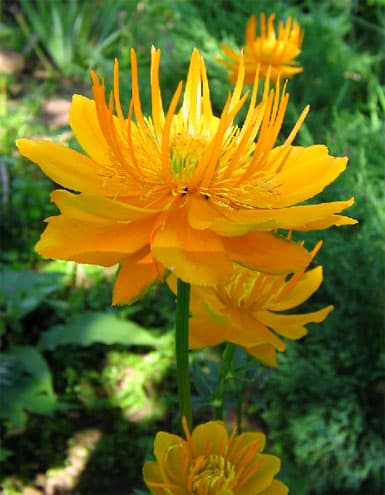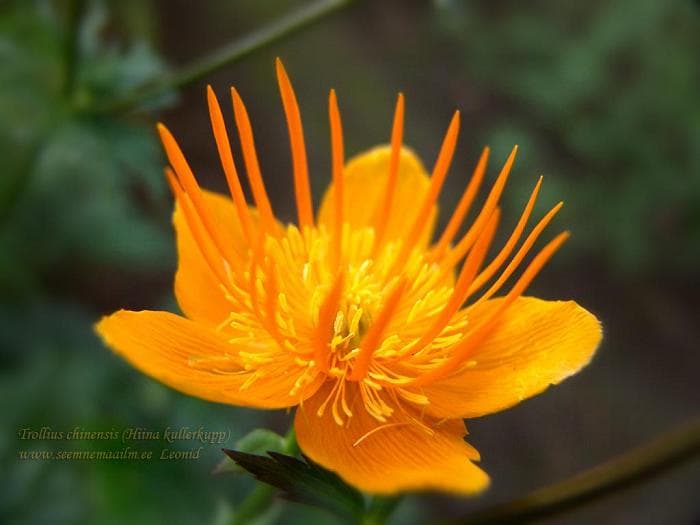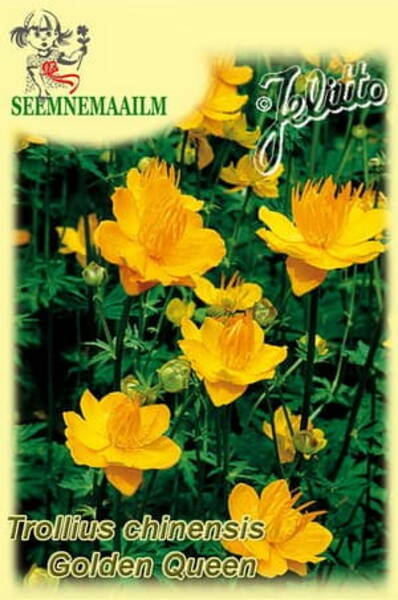Winter-hardy perennial, resistant to infection by diseases and pests.
Herbaceous perennial plant from the Ranunculaceae family.
Origin: Russia, Mongolia, Northeast China (grassy slopes).
In many respects it is similar to the Trollius asiaticus, from which it differs in the height of the bush (up to 100 cm) and more open flowers with golden-yellow wide-oval sepals and long (up to 2.5 cm), linear nectaries exceeding the sepals. Blooms from mid-July 25-30 days. In culture since 1827.
Flower colour: golden (inflorescences look like floating golden water lilies).
Foliage: basal leaves petiolate, heart-shaped, deeply fringed, 3-parted, coarsely serrate, dark green.
Flowering plant height: 80 cm.
Distance between plants: 60 cm
Winter hardiness zones: Z4 - Z7.
Soil requirements: cool, moist, medium fertile.
Use: for planting in gardens, parks, near water bodies and for cutting. Plant in the moist border with Eupatorium maculatum, Primula beesiana and Rodgersia aesculifolia.
Distinction: Award of Garden Merit (A.G.M.) from The Royal Horticultural Society.
Agrotechnics.
Plants are winter-hardy and moisture-loving, love the open sun or partial shade, are resistant to high and low air temperatures, and are responsive to fertilizing with mineral fertilizers. For planting in the spring, the seeds must be sown in January-February and kept for 12 weeks at a temperature of +2 + 4 ° C. Then the temperature is raised to +18+20°C.
After the appearance of the first true leaf, the seedlings dive and plant at the end of August in a permanent place. In autumn, the seeds are sown in moist loose and fertile soil at a distance of 30-40 cm from each other.
1,0 g = 850 seeds.

Germination: most species of the Ranunculus-family need lower temperatures during the cooling-period - about -5°C. The reason is probably the freezing point of these seeds, which is at -7°C, while most other seeds freeze at -5 °C. The sowing must be kept warm (about +18 to 22°C) and moist for the first 2-4 weeks. After this period the sowing must be kept at a cold temperature (between -4 and +4°C) for another 4-6 weeks. It is not so important if the temperature is higher or lower during the cooling period, but the cooling period has to be prolonged because the synthesis of the germination inducer, hormonlike acid, slows down or comes to a standstill. It is beneficial to cover the sowing with snow during the cooling-period. The temperature below it usually keeps in the optimum range of -4 to 0°C. The sowing is kept moist, and the melting snow helps to destroy the shell, which is advantageous for the germinating seedling. After this cooling-period the sowing may not be immediately exposed to high temperatures. The most effective temperatures are between +5 to 12°C, even if germination has started. The best location for this sowing, even in March, April and May, is the open field, the cold frame or a cold greenhouse.
Scheduling.
Best Sowing Dates: November - March.
Sowing to Germination: 9 - 12 weeks.
Germination to Transplant: 4 - 8 weeks Transplanting to Salable Plant: 6 - 10 weeks.
Cutting-Back at Transplanting: cut-back once to keep more compact.
Growing On: Container Size(s): 1 plug per 8/9 cm; 1-2 plugs per 11/12 cm; 2-3 plugs per 15 cm.
Vernalization: there is no current research on vernalization but a prudent recommendation for any perennial would be 6-12 weeks (a few might need 15 weeks!) at an average daily temperature of 5°C. Exposure to cold may not be necessary for flowering but might improve quality. Forcing: Early spring flowering. No forcing necessary.

Chinese Globe Flower. Bot. syn.: Trollius ledebourii.















